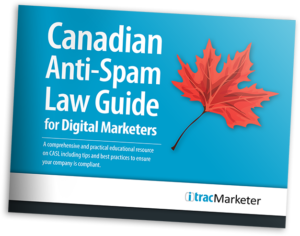Canada’s Anti-Spam Legislation (CASL) has its second anniversary on July 1st . Surprisingly, a large number of Canadian businesses still haven’t taken the time to update their email practices and customer databases to ensure CASL compliance, according to the law. If you are one of them, it’s time to stop putting off the task.
Fines for violating CASL rules can be significant — as high as one million dollars for individuals and 10 million dollars for businesses. The amount of the fines levied is at the sole discretion of the government, and so far, they have signaled it is serious about penalizing CASL violators. Several prominent companies have been fined for not meeting CASL compliance, including Rogers, Porter Airlines and Compu-finder. Yet, smaller businesses should also take heed, as they are not exempt from the rules.
On top of this, when CASL’s transitional period ends on July 1st 2017 there will also be the threat of civil actions for CASL violations. If you think Canadians would not sue over spam, think again. A Google poll last year found 54% of Canadians said they would consider joining class action lawsuits against companies for CASL violations.
Top 5 Tips for CASL Compliance
The good news is it isn’t too difficult to comply with the legislation if you are diligent and organized. The following tips will help ensure your business’s emails and customer contact lists are CASL compliant:
1) Identify yourself
Every email communication should include your name, the name of your business, and its physical mailing address. You also need to include a phone number, email or web address where you can be contacted.
2) Offer an unsubscribe option
Every email sent must include a clear unsubscribe option that is functional for a minimum of 60 days after the email is sent. If a customer chooses to unsubscribe, you have 10 days to remove their name and email address from your contact lists.
3) Be truthful
CASL compliance requires businesses to be honest and transparent in all of their email communications. Misleading subject lines, false information in the message, or misleading sender information will land you on the wrong side of the law.
These rules don’t have to get in the way of effective digital marketing. Instead, you can use these requirements to nurture trust and build your brand. The goal of CASL is to encourage business growth in a trustable online landscape. As long as your content is CASL compliant, relevant and engaging, you have nothing to fear.
4) Get express consent
The entire point of CASL is to protect Canadians from receiving unsolicited electronic communications; whether these are emails, instant messages or texts. Your first priority should be getting Express Consent from all of your contacts, old and new.
For new subscribers, you must ensure that your sign-up form includes the following:
- An unchecked email permission checkbox,
- A clear statement indicating your purpose for sending e-communications, and
- The subscriber’s right to unsubscribe at any time, and of course,
- Your company’s contact information.
Your express consent checkbox must be independent of other opt-in boxes. For permission or content preferences – you cannot bundle consents for different purposes.
When CASL became law on July 1st, 2014 the government allowed businesses a three year grace period. This means that they had the opportunity to assign a 3-year implied consent to their previously collected email contacts. That transitional period comes ends next July.
Building a customer contact list can be expensive and time-consuming. Thus, it is prudent to spend resources planning, testing and building programs to acquire Express Consent from your existing lists.
5) Once your database is up to date, keep it that way
CASL requires the following information to be actively tracked and managed:
- Different types of consent,
- Expiration dates,
- Names,
- Email addresses as well as source collection details.
The goal is to ensure that emails have been captured properly and there are no expired consent emails in your commercial electronic messages.
In addition, managing a comprehensive and up-to-date database will make it easier to produce an audit trail, in case the government requires proof of your compliance status.
Resources
There are many resources available to educate yourself and your company on CASL. This ranges from Government-provided content to online training and learning, guides and as well as counseling by legal experts.
Make sure you understand what the rules are and what it means to be compliant. This will allow you to properly assess your situation, identify issues and build a CASL compliance solution and processes that will work for your business. If you do determine that you need help, there are legal experts as well as technology solution providers who can assist you. Whether that is further understanding or managing CASL rules properly within your business.
Click here for access to a Free comprehensive Canadian Anti-Spam Law Guide for Marketers.
About itracMarketer –
itracMarketer is a simple and affordable CASL compliant Email and marketing automation solution built for medium-sized and large Canadian business. itracMarketer powers your digital marketing with time saving automated campaigns and lead capture. It is tailored for your customer interactions, and provides reliable, personal touch service.

Leave A Comment